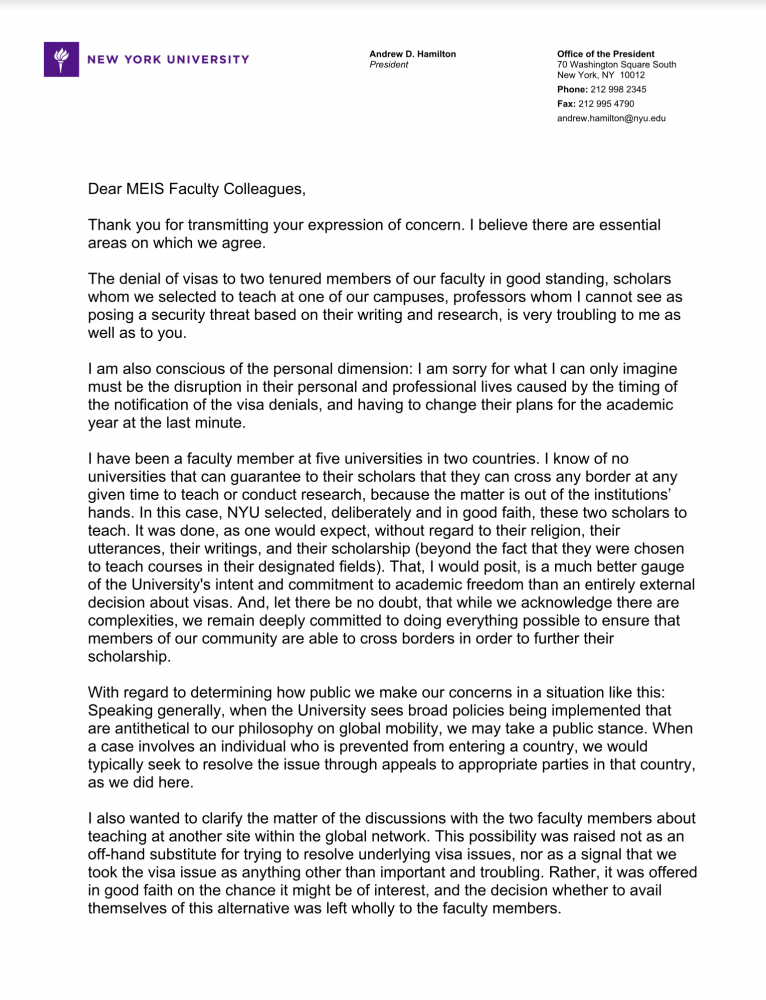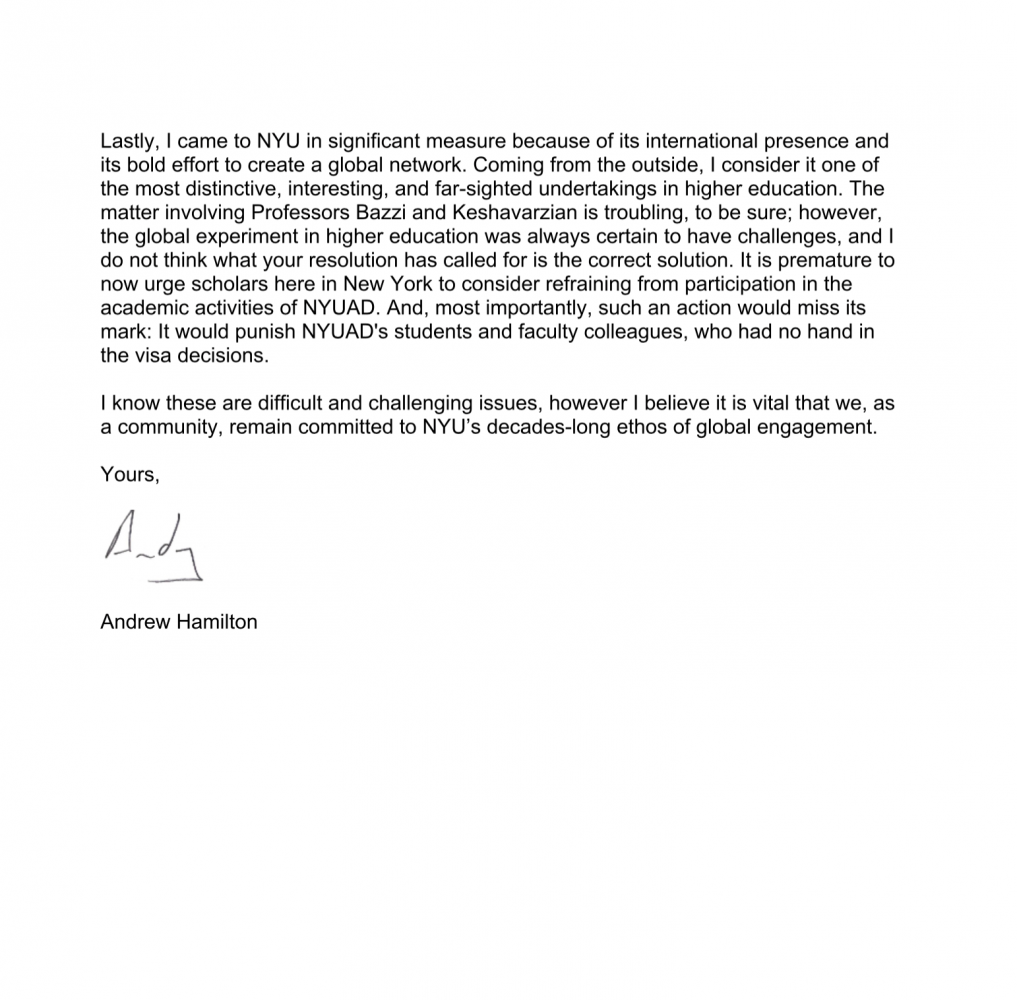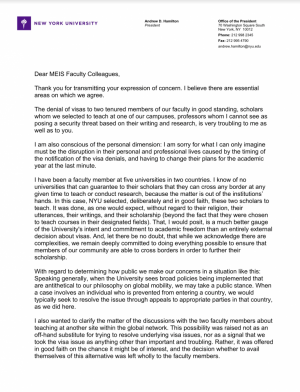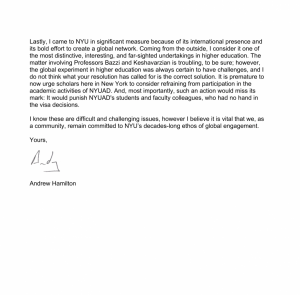Hamilton Letter Explains University’s Position in Wake of Visa Denials
October 20, 2017
Sixteen days after the Department of Middle Eastern and Islamic Studies penned a letter to NYU administrators over complaints of academic freedom violations at NYU Abu Dhabi, President Andrew Hamilton has come forward with a formal response.
His letter, addressed to the department, was given to WSN on Wednesday afternoon. The response comes after multiple letters to Hamilton by the Department of Middle Eastern and Islamic Studies, the Middle Eastern Studies Association — a group of academics studying the Middle East — and the American Association of University Professors criticising NYU’s handling of recent visa denials of NYU Professors Mohamad Bazzi and Arang Keshavarzian.
Hamilton began his letter by saying that he agreed with the department of Middle Eastern and Islamic Studies on several points. The president acknowledged that Bazzi and Keshavarzian’s visa denials “troubled” him, and he expressed sympathy over the personal toll these events have taken on the professors.
A key point of contention for writers of the MESA and AAUP letters concerns NYU’s lack of public responses condemning these visa denials. The two affected professors previously told WSN they were disappointed that the university did not speak out publicly on these issues as it has done with recent policy proposals by President Donald Trump’s Administration. On this issue, Hamilton did not agree.
“When the university sees broad policies being implemented that are antithetical to our philosophy on global mobility, we may take a public stance,” Hamilton said in the letter. “When a case involves an individual who is prevented from entering a country, we would typically seek to resolve the issue through appeals to appropriate parties in that country, as we did here.”
Hamilton also reaffirmed the university’s stated commitment to academic freedoms across all NYU campuses.
“Let there be no doubt, that while we acknowledge there are complexities, we remain deeply committed to doing everything possible to ensure that members of our community are able to cross borders in order to further their scholarship,” Hamilton said in the letter.
For several NYU professors, this statement did not go far enough in addressing concerns of academic freedom and NYU’s commitment to defending faculty and staff. One such professor, Zachary Lockman, teaches in the Department of Middle Eastern and Islamic Studies.
“Hamilton seems to suggest that NYU should only speak out if a country has a ‘broad policy’ of denying entry, like the Trump Administration’s ‘Muslim ban,’ but clearly whatever ‘private appeals’ NYU made were ineffective in these cases,” Lockman said in an email.
Lockman’s points were echoed by the chair of the Department of Middle Eastern and Islamic Studies Marion Katz.
“We would like to see a response from the administration unambiguously stating that the denial of visas to our NYU colleagues, whether for reasons of religious identity of national origin or because of the content of their scholarship, is unacceptable to NYU as an institution,” Katz said.
While many NYU faculty members have spoken out over academic freedom violations at NYUAD, not all agree on the validity of the violations. Phillip Kennedy, a professor in the Department of Middle Eastern and Islamic Studies and an NYUAD faculty member, rejected claims of violations in the Emirati campus.
“These accusations generally lack any kind of meaningful consultation with the faculty and students on the ground,” Kennedy said.
Despite documented denials of entry to the country by NYU Professor Andrew Ross and former student Kristina Bogos over research critical to the UAE, Kennedy said he is not personally concerned about potential retaliation from the government for research they deem harmful.
While Hamilton’s response marks the first semi-open form of dialogue to come from the university, his letter does not validate the accusations of academic freedom violations made by professors Bazzi, Keshavarzian, Ross, Lockman and others.
It is unclear whether Hamilton or anyone in his administration plans to make a public statement addressing visa denials or concerns of academic freedom.
While this first attempt at dialogue may please some dissenting voices, others like Lockman believe the issues regarding NYUAD run deep and will require additional discussion.
“NYU had a dysfunctional relationship with the UAE,” Lockman said. “It’s basically been taken hostage by the UAE, who hold power over the future of NYUAD.”
Email Mack DeGeurin at [email protected].




























































































































































